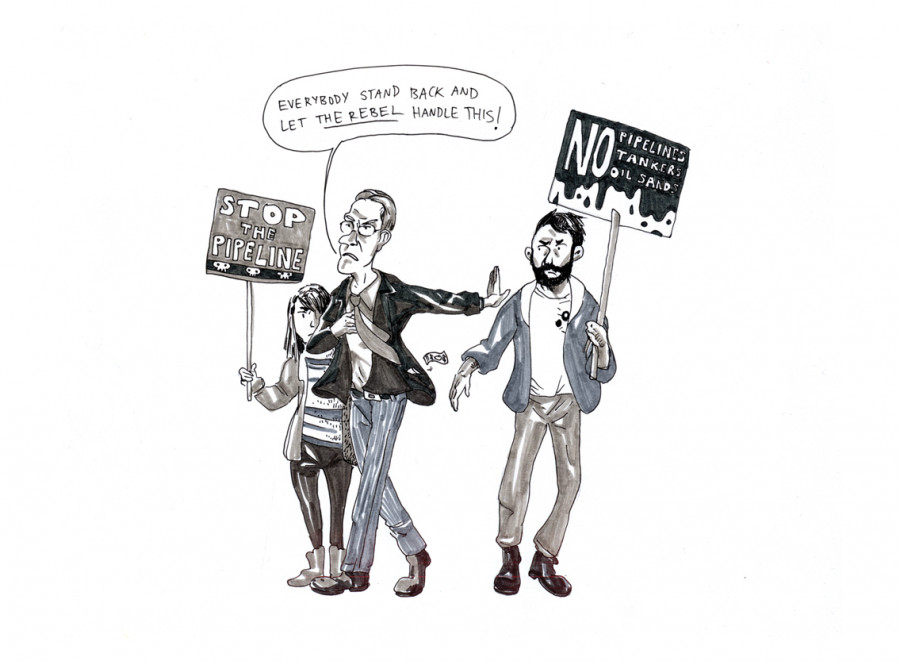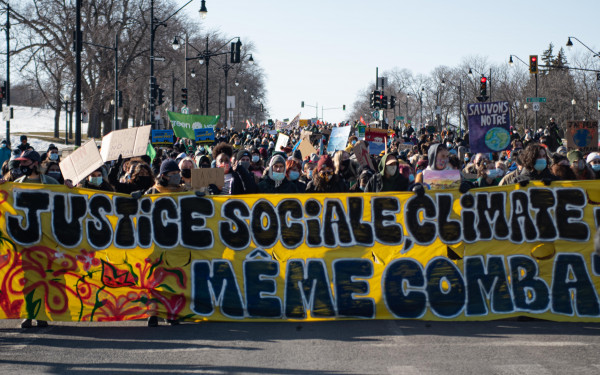Hypocrisy, Not Integrity
Climate Change “Rebel” Won’t Save Us from Global Warming
On Nov. 11, Concordia’s Centre for Sustainable Enterprise welcomed Harvard professor Michael C. Jensen, and it looked like I had found one of a rare breed of moneymen who might not be part of the problem, but part of the solution.
Calling himself a rebel and citing Mahatma Gandhi and Martin Luther King Jr., Jensen told the crowd that business should be committed to something bigger than wealth maximization. Two-thirds of what MBA programs teach is false, he insisted, and finance is “a godawful mess” with “no integrity anywhere.”
He went on to say that integrity is essential. It’s “a mountain with no top”—he leaned heavily on that metaphor—but we must learn to be joyfully engaged in the climb, because the higher up we go, the happier, more fulfilled and more successful we’ll be.
Integrity. Wonderful.
So during the question and answer period I asked him if he thought it was hypocritical for the university to offer a program in sustainable investment while still investing in the fossil fuel industry. I also asked him if he would support calls to form a committee—that would include students—that would develop a sustainable investment policy for the university.
That’s when Jensen turned on me.
“You clearly haven’t come here to listen to what I have to say,” he replied, “but to promote your own agenda.”
His antagonism caught me off guard. I had been listening, hadn’t I? Wasn’t he talking about integrity? I’m no business student, so maybe I missed something. Maybe I’m not as good at compartmentalizing the issues as he is.
Or maybe he just didn’t like the Divest Concordia button pinned to my sweater.
Jensen went on to suggest that divesting from fossil fuels would entail some exorbitant fictitious cost, that environmental justice advocates are radicals who usually do more harm than good, and that we should just relax because everything will be taken care of by governments, corporations and various bigwig organizations.
Is that integrity? Or hypocrisy?
Of course, I shouldn’t have been surprised by Jensen’s reaction. Why would he speak out against fossil fuel investment at Concordia when he hasn’t done so at home?
The most recent U.S. Securities and Exchange Commission filings show that Harvard currently has $34.6 million invested in the top 200 publicly traded fossil fuel companies, according to Divest Harvard.
By comparison, Concordia’s own endowment fund has a total of $107 million in investments, a figure that is much smaller than Harvard’s $32.7 billion, but still represents a significant amount.
A poll conducted by the Harvard Undergraduate Council last year found that 72 per cent of those who voted favoured divestment—that’s 20 per cent more than those who voted to divest from apartheid South Africa in 1990.
Harvard’s most well-known advocate for climate justice is likely Tim DeChristopher. After spending 21 months in federal prison for an act of peaceful civil disobedience during an auction of public land, DeChristopher is now completing his first semester at Harvard Divinity School.
In response to the university’s continued support for the fossil fuel industry, DeChristopher issued a statement criticizing Harvard President Drew Faust for her lack of vision and leadership and for siding with an industry “committed to ruining our future.”
“I strongly suspect that time will show that [Faust] chose the wrong side of history,” wrote DeChristopher. “Harvard needs leaders better able to see beyond their own time, and the students who will continue to push for divestment are a great example.”
It’s becoming increasingly clear that we can no longer wait for our current so-called leaders—even those who perceive themselves “rebels”—to save us from global climate change and its disastrous effects.
We have to save ourselves.
Noam Chomsky—who, as a young professor, adamantly opposed his own university’s involvement in the Vietnam War—spoke at Concordia a few weeks ago about the front-line role of indigenous populations in opposing environmental destruction.
Through the Idle No More movement and the ongoing resistance to shale gas exploration in the Elsipogtog First Nation in New Brunswick, Canada’s Aboriginal Peoples are fighting to keep resource extraction companies off their traditional lands and leave oil and gas in the ground.
Aboriginal Peoples are possibly our greatest warriors in the battle to ensure a livable future for generations to come, and they need our support and solidarity.
Groups like Divest Harvard and Divest Concordia also have an important role to play. Divestment is only part of the solution, but it’s a part that history has shown can have significant consequences. In a vacuum of leadership, even small actions can have a huge impact, and Concordia would be wise to see this vacuum for the opportunity it is.
And let’s not forget that massive amounts of greenhouse gases are emitted through industrial livestock production. Many suggest that simply eating less meat is the single greatest thing we can do to curb climate change—and we can do it right away.
The Philippines were recently struck by Super Typhoon Haiyan, a record storm that climate change experts suggest may be a sign of things to come. Called Yolanda in the Philippines, it’s reported to have killed at least 4,400 people and displaced more than 900,000 others.
Filipino head delegate Yeb Sano responded with an emotional plea at the UN climate conference now underway in Warsaw, announcing that he would fast “until we see real ambition on climate action in accordance with the principles we have so upheld.”
It’s debatable whether the UN has the wherewithal to take significant action on climate change, but Sano’s use of fasting as a form of protest harkens back to Gandhi during India’s long nonviolent struggle for independence from its British colonizers.
While fasting alone will not stop climate change, it has the potential to spark meaningful conversations, like the ones Sano hopes to see.
Jensen may enjoy making offhand references to Gandhi and MLK when it’s convenient for him, but it looks as though he and his ilk aren’t quite high enough on Integrity Mountain to take such a principled stand.
Waiting for individuals like him to tackle climate change in a serious way will leave us hanging. It’s time that we take matters into our own hands.




_600_375_90_s_c1.jpg)

_600_375_90_s_c1.jpg)